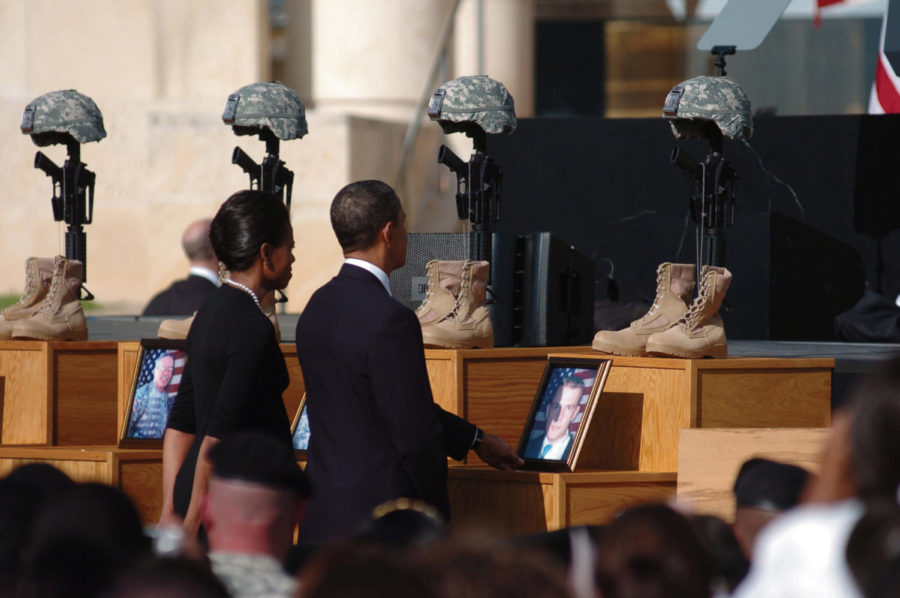Guest Column: The inscrutable Middle East and 2012
Photo courtesy of Flickr/U.S. Army
President Barack Obama and first lady Michelle Obama place a commander-in-chief’s coin on the fallen Soldier memorials honoring 13 shooting victims at the conclusion of a memorial ceremony at Fort Hood Nov. 10.
September 24, 2012
The anti-Islamic film “Innocence of Muslims” was apparently produced by Nakoula Basseley Nakoula, believed to be a Coptic Christian who was convicted of bank fraud and identity theft in 2009 and placed on supervised probation for five years.
Any depiction of the Prophet Mohammed is blasphemous in the Islamic world and caricatures or other depictions have provoked violent protests across the Muslim world in the past. The latest kerfluffle is the publication by the French magazine “Charlie Hebdo” of vulgar cartoons of Mohammed. The French government ordered its embassies and French schools abroad to close on Friday, the Muslim holy day.
The crisis spawned by this YouTube video trailer of the film in the Middle East and other Islamic countries over has vast political implications.
First, it has exploded into anti-American demonstrations all over the world. The latest violent clashes were in Sydney, Australia. Also Afghanistan, Yemen, Egypt, Morocco, the Palestinian territories, Israel, Iran, Lebanon, Malaysia, Tunisia, Bangladesh, and there was an attack on the German embassy in Sudan. These demonstrations have manifested a deep hatred of the United States and the West more generally.
What’s surprising in all of this was the fact that when Barak Obama was elected, there was the spin that now finally American relations with many countries, especially Islamic third world societies and Latin America, would become much better. After all, Obama is a multicultural person, a man of color, someone who would understand the problems and sensitivities of other cultures much better than a shoot-from-the-hip Texan like George W. Bush.
Conservatives and Republicans have ridiculed Obama for pandering to anti-American forces, criticized him for being weak in defending American interests and blamed him for the weakening of America’s role as world leader by “leading from behind,” not being more forceful and cutting defense spending and thus weakening America’s might.
Second, the United States clearly underestimated the strength and intentions of radical groups in Libya. There is now little question. The group is Ansar al-Sharia, which sympathizes with al-Qaida and appears to have a base in Derna near the Egyptian border. What now becomes a huge political issue is whether Obama and his administration failed in his obligation to be the steward of U.S. national security and conduct robust foreign policy.
There is also the sad truth that Libyan Ambassador Christopher Stevens was so naive as to believe that just because he loved Libya he did not need good security. We know that there was no security — the guard at the consulate in Tripoli only had a walkie-talkie.
The critique will be constructed on the fact, first of all, that Obama has been missing his national security briefings which are always the first thing a president does after his first cup of coffee.
A second question is whether the intelligence agencies were actually providing a sufficiently high level of threat risk.
Third, Obama has a reputation of being aloof, of not listening very well even to his own party supporters and notably members of Congress.
Fourth, although he is currently in the mode of “campaigner-in-chief” and has been mostly on the campaign trail, he is of course the commander-in-chief, and that trumps any other role.
Finally, many experts and not just Obama’s detractors have been puzzled as to why the United States encouraged the “Arab Spring” in the Middle East and North Africa, helped with significant intelligence, logistics, weapons, diplomatic push, and even a no-fly zone against Moammar Gadhafi in Libya and then seemed to lose interest.
Even though we know that Ambassador Stevens and his Embassy staff were working hard in Libya, serious questions remain as to whether, after the overthrow of dictatorships, the United States failed to aggressively follow up to help in the building of civil, security, economic and political institutions in these countries. This line of critique raises the fundamental question of whether Obama is a “competent” president. Expect to see that word to explode across your screen in super PAC and Romney political ads.
A more worrisome question is whether the United States will be sucked into more military engagements in dangerous countries just as we try to wrap up the war in Afghanistan. There is no American support for that.
We can almost see the finish line to the election of 2012 so all of this is a very flammable development. The question now being asked by almost every analyst and pundit is whether this unfolding crisis will become Obama’s Iranian Embassy hostage crisis, which helped deprive Jimmy Carter of a second term or whether the nation will rally around the commander-in-chief and spike the support for Obama.
The answer, of course, won’t be clear until the third presidential debate on Oct. 22 at Lynn University in Boca Raton, Fla., which focuses entirely on foreign policy. And in politics, the time between now and Oct. 22 is a lifetime and the Middle East may have vanished from the news, and we’ll be back to jobs and a sluggish economy.

















